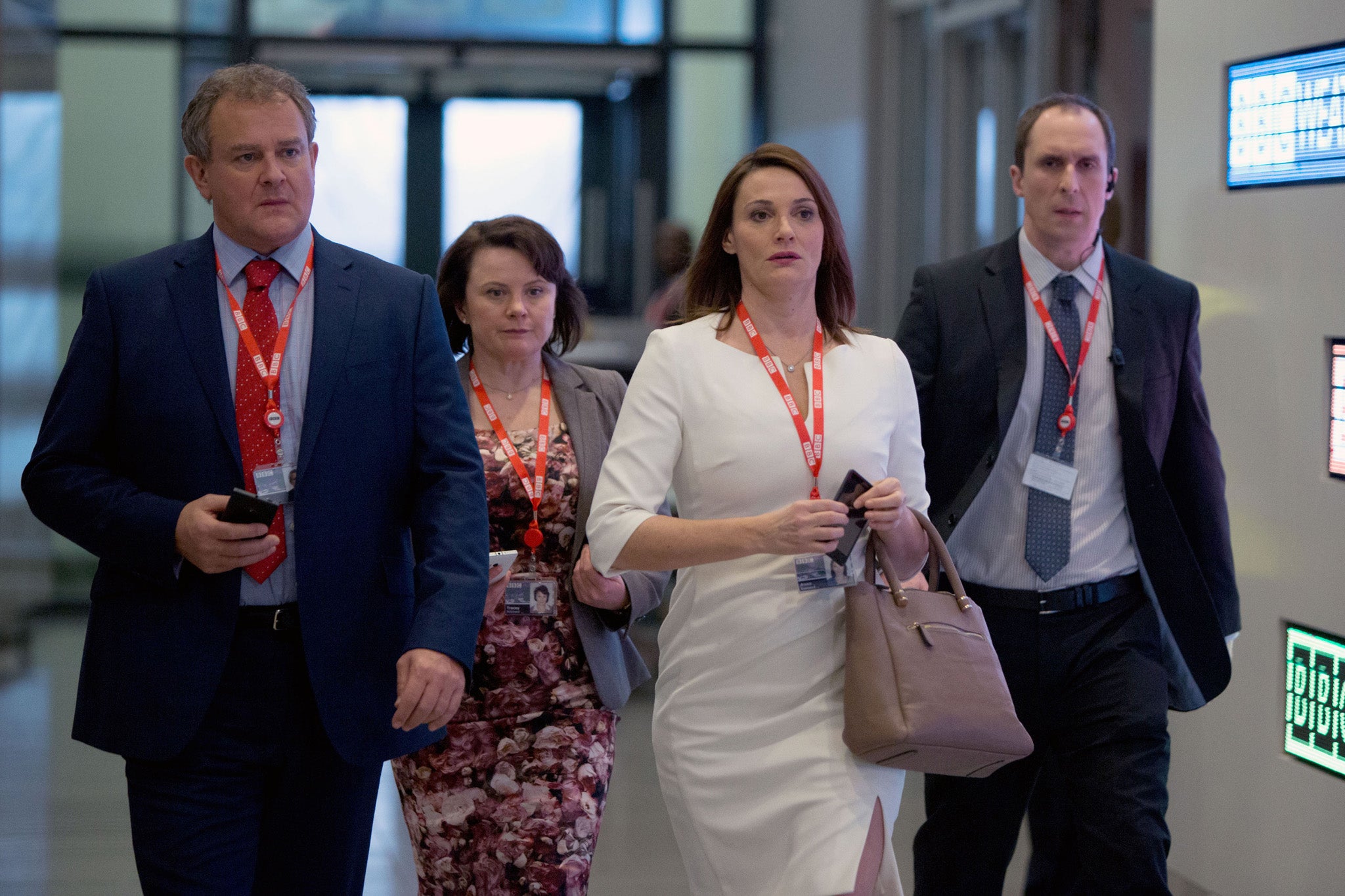Grace Dent on TV: W1A is the BBC pulling its pants down and slapping its own bare cheeks
Every episode, for me, is a ticker-tape parade of recognisable woes - not just from my nigh-continuous dealings with the Beeb, but with all channels

Your support helps us to tell the story
From reproductive rights to climate change to Big Tech, The Independent is on the ground when the story is developing. Whether it's investigating the financials of Elon Musk's pro-Trump PAC or producing our latest documentary, 'The A Word', which shines a light on the American women fighting for reproductive rights, we know how important it is to parse out the facts from the messaging.
At such a critical moment in US history, we need reporters on the ground. Your donation allows us to keep sending journalists to speak to both sides of the story.
The Independent is trusted by Americans across the entire political spectrum. And unlike many other quality news outlets, we choose not to lock Americans out of our reporting and analysis with paywalls. We believe quality journalism should be available to everyone, paid for by those who can afford it.
Your support makes all the difference.I continue to stare aghast at the BBC2 sitcom W1A. It’s acutely, excruciatingly observed and painfully funny. I watch W1A through my fingers. I have lived this life, sat in these meetings. Did John Morton and Paul Schlesinger create this drama as some sort of cathartic journey for metropolitan TV workers, or do other people get the gags? W1A, essentially, is the BBC pulling its own pants down and slapping its own bare cheeks publicly. I love them for allowing it.
Every episode, for me, is a ticker-tape parade of recognisable woes. Not just from my nigh-continuous dealings with the Beeb, but with all channels. This is how they do telly. Or don’t, in most cases.
In W1A’s return episode, an earnest northern drama writer has bankrupted himself creating a gritty drama – at the BBC’s request – set in Scarborough. He is called to London for a meeting. “I’m thinking…” says comedy-drama exec Matt Taverner, “does it have to be in Scarborough? How about… Walthamstow? Isn’t Scarborough, like, a bit one-dimensional?”
Elsewhere Will, the hapless, parentally funded intern, is ploughing through four years of Top Gear to calculate whether Jeremy Clarkson’s use of the word “tosser” breaks guidelines. Results will be delivered to Head of Values Ian Fletcher and his Way Ahead Task Team – in the Frankie Howerd meeting suite – at their daily Clarkson crisis update. Clarkson’s face is pixellated throughout this episode “so as not to offend” viewers swept up in current light entertainment fatwa.
Crucially, during this one-hour special, not one single, solitary solution to any dilemma will emerge. No scheduled meeting, picking-of-brains break-out session or thought-huddle will deliver anything vaguely actionable. Sure, some suggestions float past that could work, but no-body wants to commit themselves in case they fall flat. No television will be made today, or tomorrow either.
Meetings, on the other hand, will be abundant. Brand consultant Siobhan Sharpe’s current project is to make Wimbledon “less white”. Brain farts include a “BBC brand mash-up”. “Can’t we, like, between games, cut to Graham Norton?” she suggests. “He could sit with the tennis girlfriends saying: ‘Ooh I’m loving your dress, girl!’” Other blue-sky thinking includes Daleks entering Centre Court. Or the Strictly Come Dancing tune playing between points. Finally – hooray – a mixed-race potential tennis pundit is located. “His mum is French and his dad is from, well, somewhere,” says Siobhan, shrugging. “But he is one cooool dude!” Oh how I wish Siobhan wasn’t accurate, but I’ve met her 19 times, in various forms, this week alone.

Elsewhere in New Broadcasting House, David Wilkes is hoping to bounce back from the ratings flop Britain’s Top Village – presented by Gary Lineker and Holly Willoughby – with his new Saturday night format, Uptown Downtown. Myleene Klass will battle other celebs over who has the best home town. “Isn’t this just the same show again?” suggests producer Lucy Freeman.
None of David’s formats – not even the one featuring Kylie Minogue and a Rhodesian ridgeback hound – are any less silly than Saturday-night ITV’s actual current offering, Ninja Warrior.
Heartbreaking, despite the humour, is Will the intern’s discovery that his security pass is deactivated. Daily he loiters at the reception desk with Ian Fletcher’s special coffee asking real employees to sign him in. Will is utterly useless – bewilderingly so – but completely well-meaning. No-one quite has the heart to tell Will that his internship has ended. In fact it did around eight months ago.

Watch Apple TV+ free for 7 days
New subscribers only. £8.99/mo. after free trial. Plan auto-renews until cancelled

Watch Apple TV+ free for 7 days
New subscribers only. £8.99/mo. after free trial. Plan auto-renews until cancelled

Crown jewel subplot of the opening episode was a visit from Prince Charles, who sent two lackies to the BBC with pre-word that he didn’t do sweetcorn and wanted to meet real people of all levels. The combination of strict royal security requirements combined with the Way Ahead team’s inability to answer a straight question led, of course, to chaos.
David Tennant’s wonderfully dry voiceover explained that Broadcasting House had existed for decades, but recently the BBC spent millions of pounds on a state-of-the-art building next door, which they called New Broadcasting House. The older building, still in use, was now called Old Broadcasting House.
Due to the similarity of these names endless confusion was caused, leading to lots of people who were due to appear on live TV and so on being continuously lost. I wish this was a product of John Morton’s wicked mind, but it’s completely true. Charles sat in his Range Rover patiently. By and large, it was the safest place for him.
Join our commenting forum
Join thought-provoking conversations, follow other Independent readers and see their replies
Comments